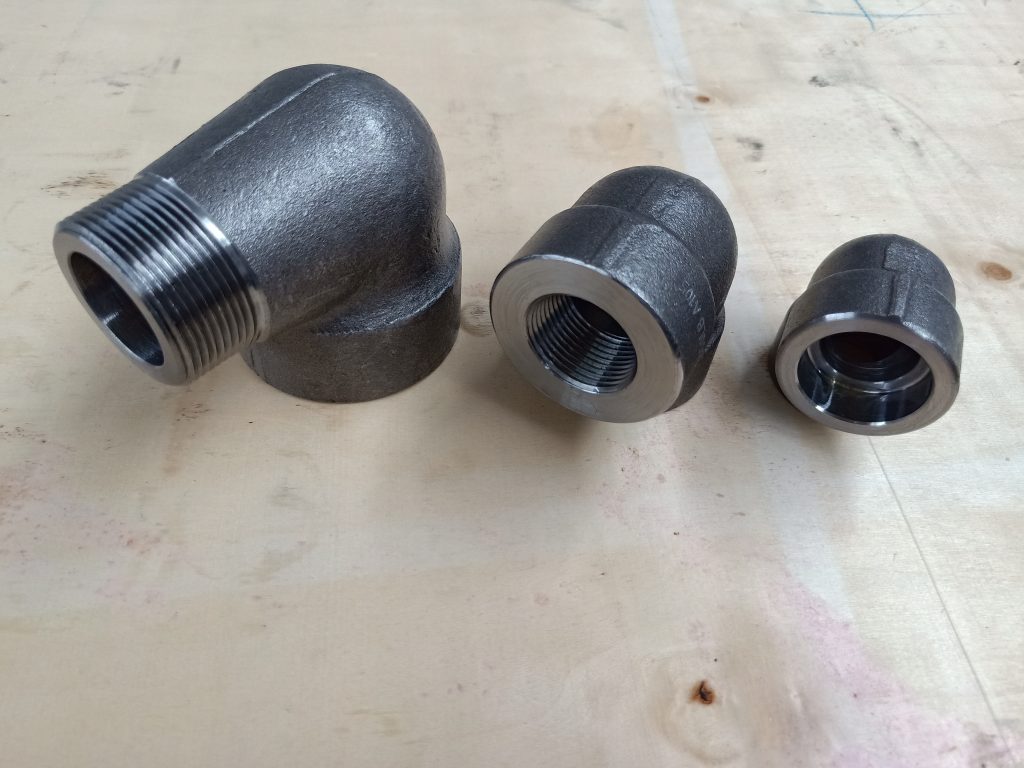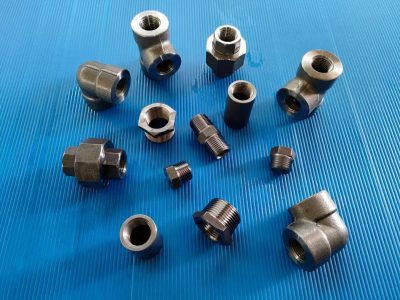
Forged threaded fittings are widely used in high-pressure piping systems, particularly in the oil and gas industry. They are available in a wide range of sizes, materials, and pressure ratings, and are designed to connect threaded pipes or other fittings. Here are some key details about forged threaded fittings:
Material: Forged threaded fittings can be made from a variety of materials, including carbon steel, stainless steel, alloy steel, and other special alloys. The choice of material depends on the specific application and the requirements for strength, corrosion resistance, and temperature resistance.
Sizes: Forged threaded fittings are available in a wide range of sizes, typically ranging from 1/8 inch to 4 inches in diameter. The fittings are available in standard and custom sizes to meet the requirements of specific applications.
Pressure ratings: Forged threaded fittings are available in various pressure ratings, typically ranging from 2000 to 9000 psi. The pressure rating depends on the size, material, and design of the fitting, as well as the specific application.
Types: There are various types of forged threaded fittings, including elbows, tees, couplings, unions, plugs, and bushings. Each type of fitting is designed to connect two or more threaded pipes or fittings at different angles and configurations.
Manufacturing standards: Forged threaded fittings are manufactured according to various industry standards, including ASME B16.11, MSS SP-79, MSS SP-83, and others. These standards specify the dimensions, materials, and testing requirements for forged threaded fittings.
Surface finish: Forged threaded fittings can be supplied with various surface finishes, including galvanizing, painting, coating, sandblasting, and polishing. The choice of surface finish depends on the specific application and the level of protection required.
Overall, forged threaded fittings are essential components of high-pressure piping systems. They are available in a variety of materials, sizes, and pressure ratings, and can be manufactured to meet various industry standards. By choosing the right type of forged threaded fitting for a specific application, piping systems can be assembled quickly, safely, and efficiently.
The following table is a brief introduction for SPECIFICATION OF FORGED FITTINGS . The specific requirements about the Forged Fittings, welcome to contact and talk more !
窗体底端
| Parameter | Specification |
| Product Name | Threaded Fittings |
| Material | Carbon Steel, Stainless Steel, Alloy Steel, Duplex Steel, etc. |
| Size Range | 1/8" - 4" (DN6 - DN100) |
| Pressure Rating | 2000 lbs, 3000 lbs, 6000 lbs |
| Manufacturing Standard | ASME B16.11, MSS-SP-79, MSS-SP-83, MSS-SP-95, MSS-SP-97 |
| Connection Type | Threaded Connection |
| Thread Type | NPT, BSPT, BSPP |
| Surface Finish | Sandblasting, Pickling, Galvanizing , Passivation, etc. |
| Application | Oil and Gas, Chemical, Petrochemical, Power Generation, etc. |
Forged fittings are manufactured to meet various standards set by organizations such as ASTM, ASME, MSS, and API. The following are some common standards used for forged fittings:
| Standard | Description |
| ASTM A105 | Standard specification for carbon steel forgings for piping applications |
| ASTM A182 | Standard specification for forged or rolled alloy and stainless steel pipe flanges, forged fittings, and valves and parts for high-temperature service |
| MSS SP-83 | Class 3000 and 6000 Pipe Unions, Socket Welding and Threaded (covers forged steel fittings) |
| MSS SP-95 | Swage(d) Nipples and Bull Plugs (covers forged steel fittings) |
| ASME B16.11 | Forged fittings, socket-welding and threaded (covers both carbon and alloy steel fittings for high-pressure and high-temperature service) |
| BS3799 | Specification for steel pipe fittings, screwed and socket-welding for the petroleum industry |
Coating for forged fittings mainly galvanizing, anti-rust oil ....

Mainly carton inside and wooden cases outside


